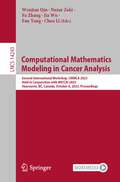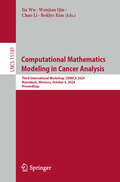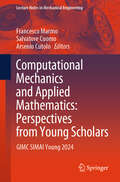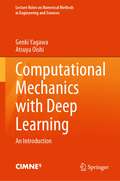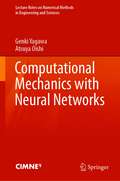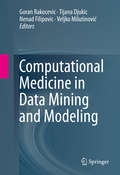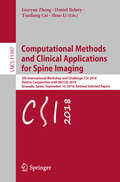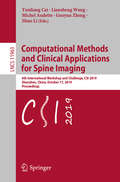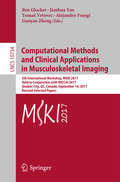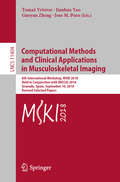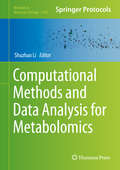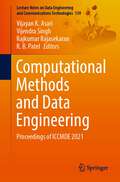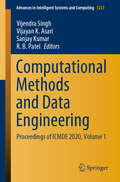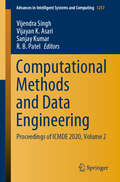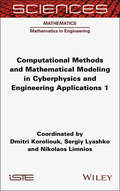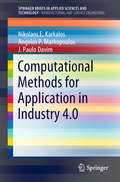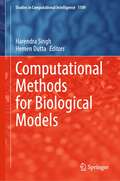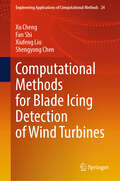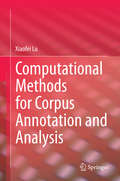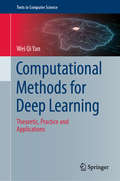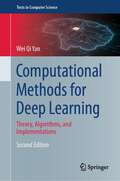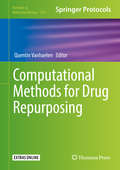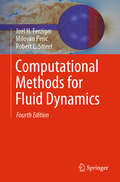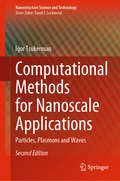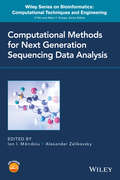- Table View
- List View
Computational Mathematics Modeling in Cancer Analysis: Second International Workshop, CMMCA 2023, Held in Conjunction with MICCAI 2023, Vancouver, BC, Canada, October 8, 2023, Proceedings (Lecture Notes in Computer Science #14243)
by Fan Yang Chao Li Fa Zhang Jia Wu Nazar Zaki Wenjian QinThis volume LNCS 14243 constitutes the refereed proceedings of the Second International Workshop, CMMCA 2023, Held in Conjunction with MICCAI 2023, on October 8, 2023, in Vancouver, BC, Canada. The 17 full papers presented were carefully reviewed and selected from 25 submissions. The conference focuses on the discovery of cutting-edge techniques addressing trends and challenges in theoretical, computational, and applied aspects of mathematical cancer data analysis.
Computational Mathematics Modeling in Cancer Analysis: Third International Workshop, CMMCA 2024, Marrakesh, Morocco, October 6, 2024, Proceedings (Lecture Notes in Computer Science #15181)
by Chao Li Jia Wu Wenjian Qin Boklye KimThis book constitutes the refereed proceedings of Third International Workshop on Computational Mathematics Modeling in Cancer Analysis, CMMCA 2024, held in Marrakesh, Morocco, on October 6, 2024, in conjunction with MICCAI 2024. The 12 full papers presented in this book were carefully reviewed and selected from 14 submissions. CMMCA serves as a platform for collaboration among professionals in mathematics, engineering, computer science, and medicine, focusing on innovative mathematical methods for analyzing complex cancer data.
Computational Mechanics and Applied Mathematics: GIMC SIMAI Young 2024 (Lecture Notes in Mechanical Engineering)
by Francesco Marmo Salvatore Cuomo Arsenio CutoloThis book collects the latest advances and innovations in the field of applied mathematics and computational mechanics, as presented at the 2nd Workshop GIMC SIMAI YOUNG, held in Naples, Italy, on July 10–12, 2024. The workshop was the joint effort of Computational Mechanics Group of the Italian Association of Theoretical and Applied Mechanics -AIMETA (GIMC) and Italian Society of Applied and Industrial Mathematics (SIMAI) and was meant to highlight the works of young researchers in the field. Topics include mathematical models for socio-epidemiological dynamics, efficient numerical methods for evolutionary PDEs, multi-scale approaches and machine learning techniques in material modelling, nonlinear material behaviour, computational methods for shells and spatial structures, assessment, monitoring, and design of masonry structures, particles in numerical simulations, non-Newtonian complex fluids, mathematical modelling in mechanobiology and oncology, mechanics of biological systems and bioinspired materials, computational approaches for complex dynamical systems, optimization methods for classical and data-driven approaches. The contributions, which were selected by means of a rigorous peer-review process, present a wealth of exciting ideas that will open novel research directions and foster multidisciplinary collaboration.
Computational Mechanics with Deep Learning: An Introduction (Lecture Notes on Numerical Methods in Engineering and Sciences)
by Genki Yagawa Atsuya OishiThis book is intended for students, engineers, and researchers interested in both computational mechanics and deep learning. It presents the mathematical and computational foundations of Deep Learning with detailed mathematical formulas in an easy-to-understand manner. It also discusses various applications of Deep Learning in Computational Mechanics, with detailed explanations of the Computational Mechanics fundamentals selected there. Sample programs are included for the reader to try out in practice. This book is therefore useful for a wide range of readers interested in computational mechanics and deep learning.
Computational Mechanics with Neural Networks (Lecture Notes on Numerical Methods in Engineering and Sciences)
by Genki Yagawa Atsuya OishiThis book shows how neural networks are applied to computational mechanics. Part I presents the fundamentals of neural networks and other machine learning method in computational mechanics. Part II highlights the applications of neural networks to a variety of problems of computational mechanics. The final chapter gives perspectives to the applications of the deep learning to computational mechanics.
Computational Medicine in Data Mining and Modeling
by Veljko Milutinović Goran Rakocevic Tijana Djukic Nenad FilipovicThis book presents an overview of a variety of contemporary statistical, mathematical and computer science techniques which are used to further the knowledge in the medical domain. The authors focus on applying data mining to the medical domain, including mining the sets of clinical data typically found in patient's medical records, image mining, medical mining, data mining and machine learning applied to generic genomic data and more. This work also introduces modeling behavior of cancer cells, multi-scale computational models and simulations of blood flow through vessels by using patient-specific models. The authors cover different imaging techniques used to generate patient-specific models. This is used in computational fluid dynamics software to analyze fluid flow. Case studies are provided at the end of each chapter. Professionals and researchers with quantitative backgrounds will find Computational Medicine in Data Mining and Modeling useful as a reference. Advanced-level students studying computer science, mathematics, statistics and biomedicine will also find this book valuable as a reference or secondary text book.
Computational Methods and Clinical Applications for Spine Imaging: 5th International Workshop and Challenge, CSI 2018, Held in Conjunction with MICCAI 2018, Granada, Spain, September 16, 2018, Revised Selected Papers (Lecture Notes in Computer Science #11397)
by Guoyan Zheng Shuo Li Daniel Belavy Yunliang CaiThis book constitutes the refereed proceedings of the 5th International Workshop and Challenge on Computational Methods and Clinical Applications for Spine Imaging, CSI 2018, held in conjunction with MICCAI 2018, in Granada, Spain, in September 2018. The 8 full papers presented together with 8 short papers and 1 keynote were carefully reviewed and selected for inclusion in this volume. Papers on novel methodology and clinical research, and also papers which demonstrate the performance of methods on the provided challenges, the aim is to cover both theoretical and very practical aspects of computerized spinal imaging.
Computational Methods and Clinical Applications for Spine Imaging: 6th International Workshop and Challenge, CSI 2019, Shenzhen, China, October 17, 2019, Proceedings (Lecture Notes in Computer Science #11963)
by Guoyan Zheng Shuo Li Yunliang Cai Liansheng Wang Michel AudetteThis book constitutes the proceedings of the 7th International Workshop and Challenge on Computational Methods and Clinical Applications for Spine Imaging, CSI 2019, which was held in conjunction with MICCAI on October 17, 2019, in Shenzhen, China. All submissions were accepted for publication; the book contains 5 peer-reviewed regular papers, covering topics of vertrebra detection, spine segmentation and image-based diagnosis, and 9 challenge papers, investigating (semi-)automatic spinal curvature estimation algorithms and providing a standard evaluation framework with a set of x-ray images.
Computational Methods and Clinical Applications in Musculoskeletal Imaging: 5th International Workshop, MSKI 2017, Held in Conjunction with MICCAI 2017, Quebec City, QC, Canada, September 10, 2017, Revised Selected Papers (Lecture Notes in Computer Science #10734)
by Tomaž Vrtovec Jianhua Yao Ben Glocker Alejandro Frangi Guoyan ZhengThis book constitutes the refereed proceedings of the 5th International Workshop and Challenge on Computational Methods and Clinical Applications for Musculoskeletal Imaging, MSKI 2017, held in conjunction with MICCAI 2017, in Quebec City, QC, Canada, in September 2017. The 13 workshop papers were carefully reviewed and selected for inclusion in this volume. Topics of interest include all major aspects of musculoskeletal imaging, for example: clinical applications of musculoskeletal computational imaging; computer-aided detection and diagnosis of conditions of the bones, muscles and joints; image-guided musculoskeletal surgery and interventions; image-based assessment and monitoring of surgical and pharmacological treatment; segmentation, registration, detection, localization and visualization of the musculoskeletal anatomy; statistical and geometrical modeling of the musculoskeletal shape and appearance; image-based microstructural characterization of musculoskeletal tissue; novel techniques for musculoskeletal imaging.
Computational Methods and Clinical Applications in Musculoskeletal Imaging: 6th International Workshop, MSKI 2018, Held in Conjunction with MICCAI 2018, Granada, Spain, September 16, 2018, Revised Selected Papers (Lecture Notes in Computer Science #11404)
by Tomaž Vrtovec Jianhua Yao Guoyan Zheng Jose M. PozoThis book constitutes the refereed proceedings of the 6th International Workshop on Computational Methods and Clinical Applications for Musculoskeletal Imaging, MSKI 2018, held in conjunction with MICCAI 2018, in Granada, Spain, in September 2018. The 13 workshop papers were carefully reviewed and selected for inclusion in this volume. Topics of interest include all major aspects of musculoskeletal imaging, for example: clinical applications of musculoskeletal computational imaging; computer-aided detection and diagnosis of conditions of the bones, muscles and joints; image-guided musculoskeletal surgery and interventions; image-based assessment and monitoring of surgical and pharmacological treatment; segmentation, registration, detection, localization and visualization of the musculoskeletal anatomy; statistical and geometrical modeling of the musculoskeletal shape and appearance; image-based microstructural characterization of musculoskeletal tissue; novel techniques for musculoskeletal imaging.
Computational Methods and Data Analysis for Metabolomics (Methods in Molecular Biology #2104)
by Shuzhao LiThis book provides a comprehensive guide to scientists, engineers, and students that employ metabolomics in their work, with an emphasis on the understanding and interpretation of the data. Chapters guide readers through common tools for data processing, using database resources, major techniques in data analysis, and integration with other data types and specific scientific domains. Written in the highly successful Methods in Molecular Biology series format, chapters include introductions to their respective topics, practical guidance of methods and techniques, useful web supplements, and connect the steps from experimental metabolomics to scientific discoveries. Authoritative and cutting-edge, Computational Methods and Data Analysis for Metabolomics to ensure successful results in the further study of this vital field.
Computational Methods and Data Engineering: Proceedings of ICCMDE 2021 (Lecture Notes on Data Engineering and Communications Technologies #139)
by Vijendra Singh Vijayan K. Asari R. B. Patel Rajkumar RajasekaranThe book features original papers from International Conference on Computational Methods and Data Engineering (ICCMDE 2021), organized by School of Computer Science and Engineering, Vellore Institute of Technology, Vellore, Tamil Nadu, India, during November 25–26, 2021. The book covers innovative and cutting-edge work of researchers, developers, and practitioners from academia and industry working in the area of advanced computing.
Computational Methods and Data Engineering: Proceedings of ICMDE 2020, Volume 1 (Advances in Intelligent Systems and Computing #1227)
by Sanjay Kumar Vijendra Singh Vijayan K. Asari R. B. PatelThis book gathers selected high-quality research papers from the International Conference on Computational Methods and Data Engineering (ICMDE 2020), held at SRM University, Sonipat, Delhi-NCR, India. Focusing on cutting-edge technologies and the most dynamic areas of computational intelligence and data engineering, the respective contributions address topics including collective intelligence, intelligent transportation systems, fuzzy systems, data privacy and security, data mining, data warehousing, big data analytics, cloud computing, natural language processing, swarm intelligence, and speech processing.
Computational Methods and Data Engineering: Proceedings of ICMDE 2020, Volume 2 (Advances in Intelligent Systems and Computing #1257)
by Sanjay Kumar Vijendra Singh Vijayan K. Asari R. B. PatelThis book gathers selected high-quality research papers from the International Conference on Computational Methods and Data Engineering (ICMDE 2020), held at SRM University, Sonipat, Delhi-NCR, India. Focusing on cutting-edge technologies and the most dynamic areas of computational intelligence and data engineering, the respective contributions address topics including collective intelligence, intelligent transportation systems, fuzzy systems, data privacy and security, data mining, data warehousing, big data analytics, cloud computing, natural language processing, swarm intelligence, and speech processing.
Computational Methods and Mathematical Modeling in Cyberphysics and Engineering Applications 1
by Nikolaos Limnios Dmitri Koroliouk Sergiy LyashkoMathematical methods in engineering are characterized by a wide range of techniques for approaching various problems. Moreover, completely different analysis techniques can be applied to the same problem, which is justified by the difference in specific applications. Therefore, the study of the analyses and solutions of specific problems leads the researcher to generate their own techniques for the analysis of similar problems continuously arising in the process of technical development. Computational Methods and Mathematical Modeling in Cyberphysics and Engineering Applications contains solutions to specific problems in current areas of computational engineering and cyberphysics.
Computational Methods for Application in Industry 4.0 (SpringerBriefs in Applied Sciences and Technology)
by J. Paulo Davim Angelos P. Markopoulos Nikolaos E. KarkalosThis book presents computational and statistical methods used by intelligent systems within the concept of Industry 4.0. The methods include among others evolution-based and swarm intelligence-based methods. Each method is explained in its fundamental aspects, while some notable bibliography is provided for further reading. This book describes each methods' principles and compares them. It is intended for researchers who are new in computational and statistical methods but also to experienced users.
Computational Methods for Biological Models (Studies in Computational Intelligence #1109)
by Hemen Dutta Harendra SinghThis book discusses computational methods related to biological models using mathematical tools and techniques. The book chapters concentrate on numerical and analytical techniques that provide a global solution for biological models while keeping long-term benefits in mind. The solutions are useful in closely understanding biological models, and the results will be very useful for mathematicians, engineers, doctors, scientists and researchers working on real-life biological models. This book provides significant and current knowledge of biological models related to real-life applications. The book covers both methods and applications.
Computational Methods for Blade Icing Detection of Wind Turbines (Engineering Applications of Computational Methods #24)
by Xiufeng Liu Shengyong Chen Xu Cheng Fan ShiThis book thoroughly explores the realm of data-driven blade-icing detection for wind turbines, focusing on multivariate time series classification to enhance the reliability and efficiency of wind energy utilization. The widespread prevalence of sensor technology in wind turbines, coupled with substantial data collection, has paved the way for advanced data-driven methodologies, which do not require extensive domain knowledge or additional mechanical tools. The interdisciplinary appeal of this study has drawn attention from experts in fields like computer science, mechanical engineering, and renewable energy systems. Adopting a comprehensive approach, the book lays down a foundational framework for blade-icing detection, stressing the critical role of sensor data integration and the profound impact of machine learning techniques in refining the detection processes. The book is designed for undergraduate and graduate students keen on renewable energy technologies, researchers delving into machine learning applications in energy systems, and engineers focusing on sustainable solutions for enhancing wind turbine performance.
Computational Methods for Corpus Annotation and Analysis
by Xiaofei LuIn the past few decades the use of increasingly large text corpora has grown rapidly in language and linguistics research. This was enabled by remarkable strides in natural language processing (NLP) technology, technology that enables computers to automatically and efficiently process, annotate and analyze large amounts of spoken and written text in linguistically and/or pragmatically meaningful ways. It has become more desirable than ever before for language and linguistics researchers who use corpora in their research to gain an adequate understanding of the relevant NLP technology to take full advantage of its capabilities. This volume provides language and linguistics researchers with an accessible introduction to the state-of-the-art NLP technology that facilitates automatic annotation and analysis of large text corpora at both shallow and deep linguistic levels. The book covers a wide range of computational tools for lexical, syntactic, semantic, pragmatic and discourse analysis, together with detailed instructions on how to obtain, install and use each tool in different operating systems and platforms. The book illustrates how NLP technology has been applied in recent corpus-based language studies and suggests effective ways to better integrate such technology in future corpus linguistics research. This book provides language and linguistics researchers with a valuable reference for corpus annotation and analysis.
Computational Methods for Deep Learning: Theoretic, Practice and Applications (Texts in Computer Science)
by Wei Qi YanIntegrating concepts from deep learning, machine learning, and artificial neural networks, this highly unique textbook presents content progressively from easy to more complex, orienting its content about knowledge transfer from the viewpoint of machine intelligence. It adopts the methodology from graphical theory, mathematical models, and algorithmic implementation, as well as covers datasets preparation, programming, results analysis and evaluations.Beginning with a grounding about artificial neural networks with neurons and the activation functions, the work then explains the mechanism of deep learning using advanced mathematics. In particular, it emphasizes how to use TensorFlow and the latest MATLAB deep-learning toolboxes for implementing deep learning algorithms.As a prerequisite, readers should have a solid understanding especially of mathematical analysis, linear algebra, numerical analysis, optimizations, differential geometry, manifold, and information theory, as well as basic algebra, functional analysis, and graphical models. This computational knowledge will assist in comprehending the subject matter not only of this text/reference, but also in relevant deep learning journal articles and conference papers.This textbook/guide is aimed at Computer Science research students and engineers, as well as scientists interested in deep learning for theoretic research and analysis. More generally, this book is also helpful for those researchers who are interested in machine intelligence, pattern analysis, natural language processing, and machine vision.Dr. Wei Qi Yan is an Associate Professor in the Department of Computer Science at Auckland University of Technology, New Zealand. His other publications include the Springer title, Visual Cryptography for Image Processing and Security.
Computational Methods for Deep Learning: Theory, Algorithms, and Implementations (Texts in Computer Science)
by Wei Qi YanThe first edition of this textbook was published in 2021. Over the past two years, we have invested in enhancing all aspects of deep learning methods to ensure the book is comprehensive and impeccable. Taking into account feedback from our readers and audience, the author has diligently updated this book. The second edition of this textbook presents control theory, transformer models, and graph neural networks (GNN) in deep learning. We have incorporated the latest algorithmic advances and large-scale deep learning models, such as GPTs, to align with the current research trends. Through the second edition, this book showcases how computational methods in deep learning serve as a dynamic driving force in this era of artificial intelligence (AI). This book is intended for research students, engineers, as well as computer scientists with interest in computational methods in deep learning. Furthermore, it is also well-suited for researchers exploring topics such as machine intelligence, robotic control, and related areas.
Computational Methods for Drug Repurposing (Methods in Molecular Biology #1903)
by Quentin VanhaelenThis detailed book explores techniques commonly used for research into drug repurposing, a well-known strategy to find alternative indications for drugs which have already undergone toxicology and pharma-kinetic studies but have failed later stages during the development, via computational methods. Thereby, it addresses the intense challenges of identifying the appropriate type of algorithm and relevant technical information for computational repurposing. Written for the highly successful Methods in Molecular Biology series, the authors of each chapter use their experience in the field to describe the implementation and successful use of a specific repurposing method thus providing lab-ready instruction. Authoritative and practical, Computational Methods for Drug Repurposing serves as an ideal guide to researchers interested in this vital area of drug development.
Computational Methods for Fluid Dynamics
by Joel H. Ferziger Milovan Perić Robert L. StreetThis book is a guide to numerical methods for solving fluid dynamics problems. The most widely used discretization and solution methods, which are also found in most commercial CFD-programs, are described in detail. Some advanced topics, like moving grids, simulation of turbulence, computation of free-surface flows, multigrid methods and parallel computing, are also covered. Since CFD is a very broad field, we provide fundamental methods and ideas, with some illustrative examples, upon which more advanced techniques are built. Numerical accuracy and estimation of errors are important aspects and are discussed in many examples. Computer codes that include many of the methods described in the book can be obtained online. This 4th edition includes major revision of all chapters; some new methods are described and references to more recent publications with new approaches are included. Former Chapter 7 on solution of the Navier-Stokes equations has been split into two Chapters to allow for a more detailed description of several variants of the Fractional Step Method and a comparison with SIMPLE-like approaches. In Chapters 7 to 13, most examples have been replaced or recomputed, and hints regarding practical applications are made. Several new sections have been added, to cover, e.g., immersed-boundary methods, overset grids methods, fluid-structure interaction and conjugate heat transfer.
Computational Methods for Nanoscale Applications: Particles, Plasmons and Waves (Nanostructure Science and Technology)
by Igor TsukermanPositioning itself at the common boundaries of several disciplines, this work provides new perspectives on modern nanoscale problems where fundamental science meets technology and computer modeling. In addition to well-known computational techniques such as finite-difference schemes and Ewald summation, the book presents a new finite-difference calculus of Flexible Local Approximation Methods (FLAME) that qualitatively improves the numerical accuracy in a variety of problems.
Computational Methods for Next Generation Sequencing Data Analysis
by Alexander Zelikovsky Ion MandoiuIntroduces readers to core algorithmic techniques for next-generation sequencing (NGS) data analysis and discusses a wide range of computational techniques and applications This book provides an in-depth survey of some of the recent developments in NGS and discusses mathematical and computational challenges in various application areas of NGS technologies. The 18 chapters featured in this book have been authored by bioinformatics experts and represent the latest work in leading labs actively contributing to the fast-growing field of NGS. The book is divided into four parts: Part I focuses on computing and experimental infrastructure for NGS analysis, including chapters on cloud computing, modular pipelines for metabolic pathway reconstruction, pooling strategies for massive viral sequencing, and high-fidelity sequencing protocols. Part II concentrates on analysis of DNA sequencing data, covering the classic scaffolding problem, detection of genomic variants, including insertions and deletions, and analysis of DNA methylation sequencing data. Part III is devoted to analysis of RNA-seq data. This part discusses algorithms and compares software tools for transcriptome assembly along with methods for detection of alternative splicing and tools for transcriptome quantification and differential expression analysis. Part IV explores computational tools for NGS applications in microbiomics, including a discussion on error correction of NGS reads from viral populations, methods for viral quasispecies reconstruction, and a survey of state-of-the-art methods and future trends in microbiome analysis. Computational Methods for Next Generation Sequencing Data Analysis: Reviews computational techniques such as new combinatorial optimization methods, data structures, high performance computing, machine learning, and inference algorithms Discusses the mathematical and computational challenges in NGS technologies Covers NGS error correction, de novo genome transcriptome assembly, variant detection from NGS reads, and more This text is a reference for biomedical professionals interested in expanding their knowledge of computational techniques for NGS data analysis. The book is also useful for graduate and post-graduate students in bioinformatics.
